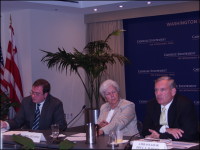Registration
You will receive an email confirming your registration.
IMGXYZ942IMGZYXSaudi Arabia’s successful experience in combating violent extremism using an unconventional “soft” rehabilitation strategy has recently attracted the attention of world counter-terrorism agencies. Christopher Boucek, an Associate at the Carnegie Endowment, and Ambassador at Large Dell. L. Dailey held a discussion on Saudi Arabia’s new counterterrorism approach. Marina Ottaway, Director of the Middle East program, moderated the discussion.
The Strategy’s Components
Christopher Boucek stated the new counter-terrorism strategy requires a significant amount of financial support and the promotion of a counter extremist ideology. The strategy consists of three major components: prevention, rehabilitation, and aftercare programs. Prevention includes cooperation among multiple ministries – including the Ministry of Education, Ministry of Interior, and Ministry of Islamic Affairs – to fight violent ideologies in schools, mosques, and internet venues. The rehabilitation stage – the best known component of the program – targets imprisoned individuals who have been detained on security offenses. Studies show that out of roughly 3000 participants in the program, approximately 1400 have been released, and only 35 have been rearrested. The after-care stage aims to ensure the successful reintegration of participants into their communities.
Implementing the Strategy
Ambassador at Large Dailey stressed the need for the U.S. to explore a similar strategy for its counter-terrorism efforts. There are two broad steps that help lead to a successful national counter-terrorism strategy: the state must acknowledge that it has terrorism-related troubles, and then implement solutions specific to its situation. In the Saudi case, the solution was a combination of viewing both the criminals and the state as victims of terrorism. Central to the success of such strategies is an overall evaluation and modification of correction facilities, the availability of resources, and institutional persistence.
Questions & Answers
In the questions and answers session the speakers further addressed the profiles of the rehabilitation program participants, and developing country-specific versions of Saudi Arabia’s strategy model for states such as Iraq. The speakers also commented on the Yemeni attempts at re-introducing a rehabilitation program and its results.
